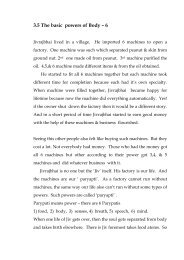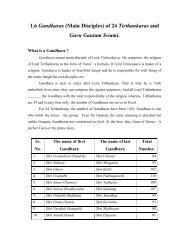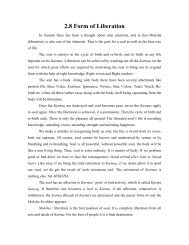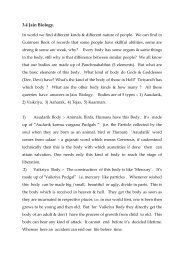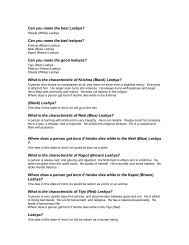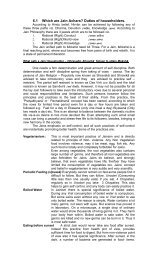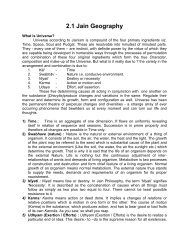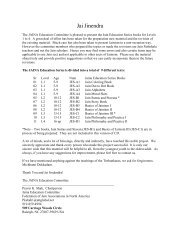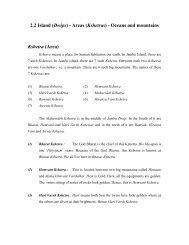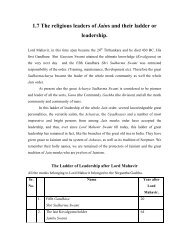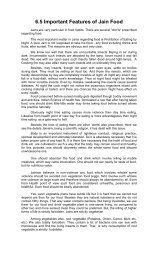âæ¢ ç¸ï¼¯ï¼ è£æ½® J - Jainism, Jain Religion - colleges
âæ¢ ç¸ï¼¯ï¼ è£æ½® J - Jainism, Jain Religion - colleges
âæ¢ ç¸ï¼¯ï¼ è£æ½® J - Jainism, Jain Religion - colleges
You also want an ePaper? Increase the reach of your titles
YUMPU automatically turns print PDFs into web optimized ePapers that Google loves.
evolved martial arts and taught these to individuals with strong physique. He also established systems of social security and<br />
penal codes. Pottery, architecture, music, dance and many other arts and crafts that enriched the human society in the fields<br />
of knowledge, arts, entertainment, administration, etc. are said to be his contributions. (R-1/e)<br />
Then one day, on the request of the people’s representatives. Nabhiraja nominated Rishabh to become the first king of this<br />
age. He arranged for an elaborate coronation ceremony and handed over the reigns of the state to Rishabh Kumar. All<br />
members of the family, large numbers of twins, and gods, attended the ceremony. The gods created a golden throne and<br />
anointed Rishabh with the water collected from various pilgrimage centres. They attired him in divine dress and ornaments<br />
and formally put the crown on his head. The twins humbly poured water on his feet from the cups made of lotus leaves.<br />
Rishabh became the first king of this era. The king of gods ordered Kuber, the god of wealth, to construct a suitable cit. This<br />
beautiful city was named Vinita; later on it became popularly known as Ayodhya. (R-2)<br />
Preaching the Path of Renunciation<br />
„±üü ¿¢¢Ý¢² ½±¼é J<br />
For many years Rishabhdev continued to rule his people and open new frontiers of knowledge. During the reign of his father<br />
the population was organized into random groups only. Rishabhdev reorganized them according to their virtues, activities and<br />
professions. He established family groups like Ugrakul, Bhogkul, Rajanyakul and Kshatriyakul. He also framed social groups<br />
according to trades and professions, and broadly divided the society into three groups. Trading community was known as<br />
Vaishya, martial community was known as Kshatriya and all other people indulging in a variety of services were known as<br />
Shudra. Till his times the Brahman group was not formed.<br />
After a long span of time (6.3 million Purva) he started loosing interest in mundane things and activities, and drifting toward<br />
detachment. He felt that he should transfer all his responsibilities to his sons and proceeds towards liberation through<br />
spiritual practices. He also desired to reach the state of omniscience and consequently show the path of disciplined life and<br />
spiritual practices. His concept was that indulgence in mundane things does not give happiness. It gives only an illusion of<br />
happiness. True happiness is derived out of freedom from mundane indulgences.<br />
Following the stream of his thoughts Rishabhdev divided the area of his rule between his one hundred sons. Bharat was<br />
given the state of Ayodhya and Bahubali that of Takshashila. Getting free of the responsibilities of the state, Rishabhdev<br />
decided to take Diksha (the formal initiation into the ascetic way). At that time the gods from the edge of the universe (the<br />
Lokantikdev) arrived and requested, “O savior of the human race! Your desire to show the path of renunciation to the<br />
mankind is admirable, kindly proceed soon to the task of propagating Dharma”.<br />
After one year of meritorious charity, Rishabhdev sat in the palanquin named Sudarshan and arrived in the Siddharth-vana<br />
garden. It was the eighth day of the dark half of the month of Charitra when, under an Ashok tree, Rishabhdev abandoned all<br />
his apparels and ornaments. He started pulling out his long strands of hair. After four fistfuls, when he was pulling out the fifth<br />
fistful of hair Indra said,<br />
jainuniversity.org<br />
“Sire! This strand of hair on the crown of your head and hanging down over your shoulders looks<br />
attractive. Kindly leave it as it is”. Rishabhdev agreed. Due to this bunch of hair he got the popular name-Keshariya ji (one<br />
with hair). The king of gods collected the hair pulled out by Rishabhdev in a divine cloth and immersed them in the divine<br />
ocean of milk.<br />
Following the example of Rishabhdev many of his subordinate rulers as well as common people get inspired to embrace the<br />
ascetic way of life. It is mentioned in scriptures that with Rishabhdev four thousand others also took Diksha. (R-3)<br />
The First Charity<br />
After becoming an ascetic, Rishabhdev took the vow of total silence and started wandering accompanied by other ascetics.<br />
When, after his penances, he went out to beg for food, he did not get anything to eat. The common people of that age were<br />
ignorant about the practice of giving food as alms. They did not even appreciate the need to do so. Whenever Rishabhdev<br />
approached them, they offered him respect and valuable gifts as they would to a king. Rishabhdev would then proceed ahead<br />
without accepting anything. As time passed the accompanying ascetics conferred among themselves and decided to eat<br />
fruits and vegetables naturally available. They slowly drifted away from Rishabhdev and the true ascetic way of life. After one<br />
entire year of wandering from place to place and doing harsh spiritual practices without touching any food or water Rishabhdev<br />
decided to beg food once again. He came to Hastinapur town.<br />
Bahubali’s son, Somprabh, was the king of Hastinapur. His son Shreyans Kumar saw a dream during the night that Suvarnagiri,<br />
the golden mountain, had turned black and he had brought back its golden hue by washing it with pitchers filled with milk. He<br />
narrated his dream to his father and friends, but no one could interpret its significance. (R-4/a)<br />
Shreyans Kumar was sitting in the balcony of his palace and brooding over the dream he saw last night. All of a sudden he<br />
heard the noise caused by happy masses that had seen Rishabhdev entering the town. Thousands of citizens of Hastinapur<br />
rushed toward Rishabhdev with gifts. Rishabhdev did not even look at these things and continues his graceful walk in the<br />
direction of the palace.<br />
Amar Muni - Tirthankar Charitra - Surana # 11<br />
www.jainuniversity.org




